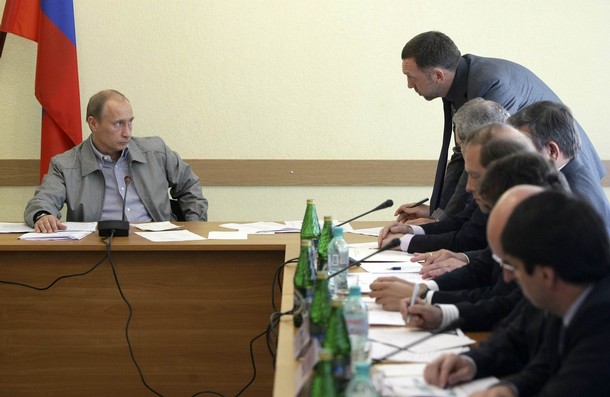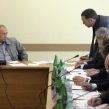
Putin Resolves Protest in Pikalevo
Publication: Eurasia Daily Monitor Volume: 6 Issue: 110
By:

A mass riot induced by the developing economic crisis, served to confirm the identity of the real boss and decision maker in Russia. While Russian President Dmitry Medvedev was speaking to the World Economic Forum in St. Petersburg on June 4, Prime Minister Vladimir Putin was trying to quell protests against the intolerable living conditions, which had developed in Pikalevo, a small Russian town near St. Petersburg. The Pikalevo residents specifically demanded that Putin rather than Medvedev personally intervene to resolve the crisis (www.polit.ru, June 4).
Things had indeed become desperate in the former industrial town of Pikalevo. Privatization in the 1990’s divided the Pikalevo aluminum producing plant, the city’s erstwhile state-owned main employer, into three privately-owned factories. Basel Cement, the largest of the three, is owned by the Russian oligarch Oleg Deripaska, who reportedly has a particularly close relationship with the Kremlin. All three factories had been shut down since winter, as a direct result of the Russian economic crisis, causing mass local unemployment. There are no small businesses to absorb those who have lost their jobs. Consequently, rapid unemployment left Pikalevo forlorn, with its former workers long unpaid. Finally, the local heating and power station cut hot water and heating to the town in mid-May, citing as justification for their action the unpaid debts accrued by Deripaska’s Basel Cement.
On May 20, the enraged citizens broke into the city hall to protest against the total shut-off of heating and hot water -demanding their long overdue back pay (www.zaks.ru, May 20). After receiving an assurance of assistance, the protesters peacefully left the building. However, once the authorities failed to deliver, the Pikalevo residents blocked a federal highway that runs through their town, holding up the traffic for seven hours (www.news.ru, June 2). They demanded Putin’s presence at a time when he was inaugurating Japan’s Nissan motor company’s $200 million assembly plant in St. Petersburg to emphasize his and foreign investors’ confidence in the potential of the Russian market.
The regional authorities carefully restrained the riot police from attacking the protesters, which might have resulted in the riots spreading further, and instead hastened to pour money into Pikalevo (www.news.ru, June 2). Two days later, Putin indeed appeared in person, giving his standard Putin-helps-the-people performance.
In a nationally televised act, Putin compared the three plant owners (including Deripaska) to cockroaches, and accused them of greed. He then threw his pen on his desk and ordered Deripaska to approach and sign an agreement on raw material supplies intended to help restart the Pikalevo factories. Putin decried the inability of the board members to make the necessary decisions without his intervention. Adding to Deripaska’s complete humiliation, following the signing of the contract Putin told him: "do not forget to return my pen" (Reuters, June 7).
Putin also chastened the Leningrad regional governor for letting the Pikalevo social disaster occur. However, consistent with his KGB background, Putin somewhat illogically lashed out at Pikalevo residents, suggesting that they had been paid to stage a provocation and block the highway to frustrate his visit -to attract his attention and demand his intervention (www.lenobl.allnw.ru, June 5).
While Putin’s visit might have abated a potential disaster in Pikalevo (rather temporarily, since Deripaska who is facing bankruptcy is now required to bail out the town), it also stoked even more apprehensions about what is occurring throughout Russia. There are more than 400 single-industry towns within Russia. Most are in the same dire straits as Pikalevo. Not that major cities are performing any better -Moscow had to slash its budget by 25 percent, since it has been so badly affected by the crisis (www.news.ru, June 3).
"Now, many workers might want to blockade roads to summon the prime minister and have their governor punished," commented the chairman of the Russian Union of Industrialists and Entrepreneurs (RSPP, "the oligarchs’ trade union") Alexander Shokhin, at the St. Petersburg Economic Forum (www.news.ru, June 5). Meanwhile, Duma deputies from the Putin-led United Russia party have tabled a bill on the re-nationalization of the Pikalevo industries (Echo Moskvy, June 4).
However, the state simply does not have sufficient funds to re-nationalize all the crumbling industries in Russia. Nor will their re-nationalization make these industries any more competitive or better managed. As Russia’s fiscal reserves dwindle, the Russian government has launched "technical talks" with the World Bank on making a $10 billion loan available to the country in 2010 (www.news.rambler.ru, June 7).
Equally, few Russians expect Putin to be able to continue intervening in this manner. On June 4, a 27-year old air hostess, one of 2,800 workers laid off by the now bankrupt DALAVIA air service, committed suicide together with her mother out of sheer despair (www.utro.ru, June 5).
All over Russia, people are staging strikes or protesting through hunger strikes against unpaid wages and rising unemployment. In desperation, construction workers in the Kurgan region in Siberia made an ironic appeal to U.S. President Barack Obama. They said that their overdue back pay was explained by their bosses in terms of the collapse of U.S. mortgages. Hence, Obama ought either to admit that the U.S. is at fault and pay them, or, alternatively proclaim the Kurgan workers’ bosses as "slanderers and America-haters." Finally, their letter suggested that Obama talks to his "G8 friends" and asks them to stop issuing Schengen visas to Russian workers’ bosses who are hastening to leave Russia for Europe "in growing numbers" as the crisis deepens.




